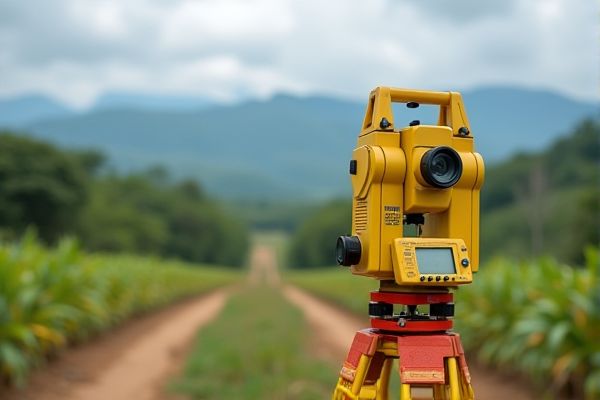
Land surveyors in the Philippines play a vital role in various sectors, including construction, real estate, and environmental management. Numerous job opportunities exist in both private firms and government agencies, often requiring a degree in civil engineering or surveying. Proficiency in surveying software and tools is essential, as these skills enhance job prospects and efficiency in the field. The demand for land surveyors is expected to grow as infrastructure projects and urban development continue to expand across the country.
Job Description
Land surveyors in the Philippines play a crucial role in various sectors, including construction, real estate, and environmental management. Their primary responsibilities include measuring land boundaries, preparing survey reports, and assisting in the development of land use plans. Proficiency in specialized surveying equipment, software, and a thorough understanding of local regulations are essential for success in this field. Career opportunities in land surveying often require a degree in surveying, engineering, or a related field, along with licensure from the Professional Regulation Commission.
Requirement
Land surveyor jobs in the Philippines typically require a bachelor's degree in civil engineering, surveying, or a related field. Certification as a licensed Geodetic Engineer is essential for compliance with local regulations and professional standards. Proficiency in surveying software and technology, as well as strong analytical and mathematical skills, are vital for success in this role. Experience with various surveying methods, including GPS and GIS, will enhance your employability in this competitive job market.
Salary and Perks Expected
Land surveyor jobs in the Philippines typically offer salaries ranging from PHP 20,000 to PHP 60,000 per month, depending on experience and qualifications. Entry-level positions may start at the lower end of this scale, while experienced surveyors or those in supervisory roles can earn significantly more. In addition to competitive salaries, many companies provide perks such as health insurance, transportation allowances, and opportunities for professional development. Your choice of employer can significantly affect not just your salary but also the benefits and career advancement opportunities available to you.
Similar Job Names
- Land Surveyor
- Senior Land Surveyor
- Geodetic Engineer
- Junior Land Surveyor
- Survey Technician
- CAD Technician
- Quantity Surveyor
- Hydrographic Surveyor
- Topographic Surveyor
- Field Surveyor
- Land Development Planner
- Project Surveyor
- Pipeline Surveyor
- Property Surveyor
- Surveying Assistant
Job Expectation Concept
Land surveyor jobs in the Philippines primarily involve measuring and mapping land boundaries, ensuring accurate data for property development and land use. Your role may include conducting field surveys, utilizing advanced technology like GPS and GIS, and preparing detailed reports for clients or government agencies. Understanding local regulations and land laws is essential in navigating the complexities of property ownership. Opportunities for land surveyors are available in both public and private sectors, with increasing demand due to ongoing infrastructure projects and urban development in the country.
Career Advantage and Weakness
Land surveying jobs in the Philippines offer significant advantages, including strong demand in various sectors such as construction, real estate, and infrastructure development. Competitive salaries and opportunities for career advancement are prevalent, reflecting the increasing investment in both urban and rural projects. However, challenges exist, such as the need for continual education and the impact of seasonal weather conditions on project timelines. Ensuring familiarity with local regulations and technology is essential for success in this field, allowing you to navigate potential weaknesses effectively.
Important Thing Must Know
Land surveyors in the Philippines play a crucial role in property development, urban planning, and infrastructure projects. They are responsible for measuring land and determining property boundaries, using advanced technology such as GPS and total stations. A professional license is required, obtainable through the Professional Regulation Commission (PRC) after passing a comprehensive examination. Job opportunities in this field are growing, particularly in urban areas where real estate and construction projects are booming. Continuous professional development and specialized training can enhance your skills, making you more competitive in the job market.
Alternative Career Options
Exploring alternative career options for land surveyors in the Philippines reveals a variety of pathways. Many professionals transition into roles such as geomatics engineers, where they leverage their surveying skills in geospatial analysis and mapping technologies. Others may find opportunities in urban planning or construction management, contributing to infrastructure development and land use planning. With the growing emphasis on environmental sustainability, positions in environmental consulting also provide a chance to apply surveying expertise in ecological assessments and land conservation projects.
Companies List
- DMCI Homes
- Aboitiz Construction
- Megawide Construction Corporation
- EGIS Philippines
- KMC Solutions
- Arcadis Philippines
- Philippine Constructors Association
- Sta. Clara International Corporation
- Hanjin Heavy Industries and Construction Philippines
- C.P. G. R.I. Corporation
List of Ideal City
Key cities in the Philippines offering promising opportunities for land surveyor jobs include Manila, Cebu, and Davao. Manila, the capital, boasts numerous government projects and developments requiring skilled land surveyors. Cebu, known for its booming real estate sector and infrastructure projects, provides a dynamic work environment. Davao, with its thriving agriculture and urbanization efforts, increasingly seeks professionals in land surveying to support its growth.
 jobs-philippines.com
jobs-philippines.com